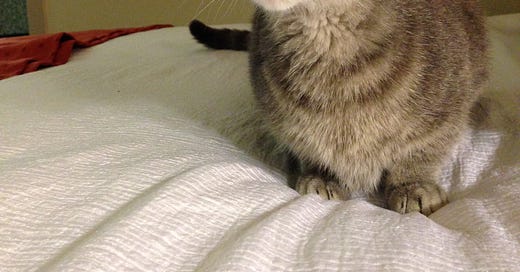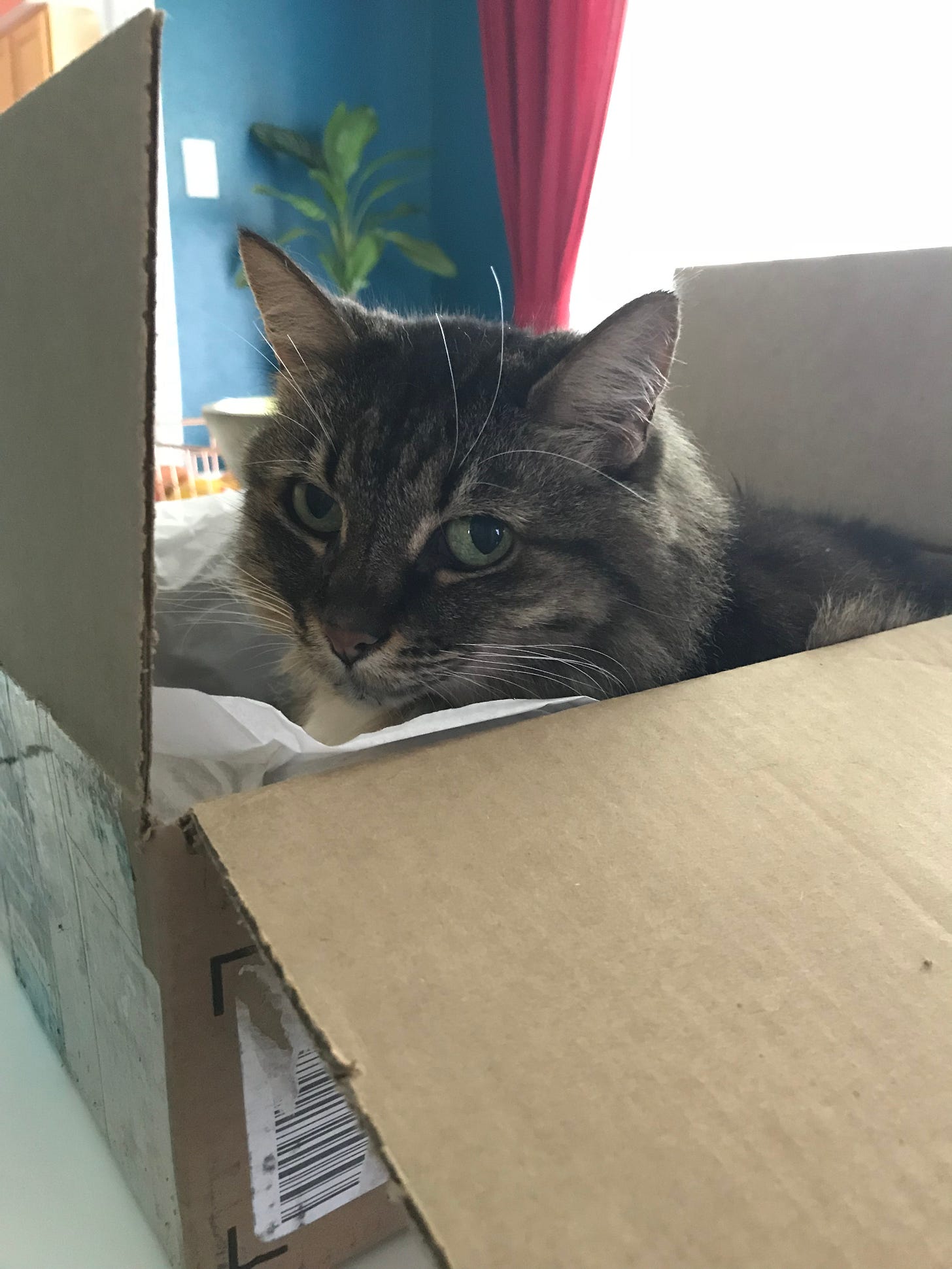Hi There Friend,
Welcome to Spirit: Notes for the Creative Contemplative, where I discuss the role of literature, creativity, and mindfulness in culture through personal essays.
I’m so glad you’re reading, and if you landed here from the wilds of the internet, please subscribe.
Thanks for reading,
Sarah
We have an elderly housecat. She is 19, which is 92 in human years according to online pet age calculators, and she has hated me for all 92 of them. Kent adopted this part-Maine Coon kitten two years before we married. She’s chosen him as her person and has no room for affection from any other human. From day one, Mimi was a fussy, prissy, bitch of a cat to me. She’s never let me pet her without hissing or swiping her claws. At the vet, her chart has red warning stickers because she lashes out there too. Her violence is vexing because in her prime she was so beautiful with a thick mane of brown, tan, and black fur, and a patch of white like a breastplate on her chest. Mackerel tabby stripes frame her forehead and cheeks.
Now, her fur is dull and mats easily because she has trouble grooming herself. She sleeps nearly constantly, in a plastic, woven basket, the one we bought for Stanley’s nursery six years ago, and which Stanley insisted be converted into Mimi’s bed. He stationed it at the end of the hallway, also insisting that we use one of the good guest pillows from the linen closet. The basket that had held receiving blankets now receives the frail body of our Mimi.
When she does rouse, she’ll cuddle with Kent and purr, but mostly she leaves her bed to eat, drink, or use the litterbox. Lately, she hasn’t been making to the litterbox. I find tiny puddles of pee on the hardwood floor, so we bought another litterbox to situate closer to Mimi. This means it’s in my studio, which means I now write from the cat box room. I’m shocked by how horrible cat poop smells, even if you use expensive litter and scoop twice a day. I’ve taken to running my essential oil diffuser. While the proprietary blend of lemon oil and bergamot, labelled “Cheer Up Buttercup,” covers the cat smell, it under-delivers on its mood-elevating promises.
I’m sad for Mimi. I’m sad, surprisingly, for a cat who’s been so hostile. I wonder about that—the way Mimi’s physical decline has me feeling teary. Why have big, hard emotions (loss and grief) settled in? I’m empathizing with Kent. He has a special bond with her.
“Seeing Mattie like this breaks my heart,” he confessed. She doesn’t seem to be in pain or suffering, but we know that could change anytime, that she could go anytime. All of us could go anytime. When we’d travelled over the holidays, Kent’s biggest worry was What will our cat sitter do if Mimi dies while we’re gone?
With our new arrangements: the sleeping basket in the hall, the easily accessible litterbox, we’ve created a cat-hospice.
In our twenties, we used to joke that pets were practice for parenting. We watched friends train puppies and thought that’s how they’ll disciple their kids. Now that I’m a mother, I don’t see such an easy correlation, but pets—and cats in particular—have become a spiritual training ground.
Twelve years ago, I was a member of a Quaker spiritual formation group. For the winter season, we set spiritual intentions, met in silent worship together weekly, and held each other in accountability. I’d chosen to work on compassion and meditation, and it didn’t take long for a cat to show up to teach me a lesson. After my yoga session every afternoon, I’d sit zazen. Like clockwork, a gray stray cat with yellow, crossed-eyes appeared outside my front door and began meowing the exact moment I silenced my monkey mind. I was annoyed by the plaintive “Meeee-oooow.” After a while, she went away, leaving paw prints in the snow. This happened three days in a row before it dawned in me that I should be practicing compassion with this poor creature, one who had clearly chosen me, which is how we came to adopted Gabby, our other cat.
But where does compassion come from? Did it come from intention? Did I muster it from sheer will to be a more spiritual person? Was it a spiritual gift bestowed? Why are any of us compelled to help others less fortunate? And why do we sometimes ignore that pull to help?
Gabby’s mewing out in the cold snow made me sad, and I had the power to do something about it to make me less sad, so I did. However, I can’t help but feel a discomforting gap that it’s easier to love a homeless cat than a homeless person. From an evolutionary perspective, why be compassionate at all if it doesn’t aid my survival?
Some would argue practicing compassion is evidence of our interconnectedness. In Fierce Love, Rev. Dr. Jacqui Lewis explains the Zulu concept of Umuntu ngumuntu nagabuantu, “which literally means that a person is a person through other people.” In other words, Lewis reminds me, “we are impacted by the circumstances that impact those around us. What hurts you hurts me, what heals you heals me.”
Ignoring those hurting in our community, looking away at the people on the street that need help denies healing and makes us all sick. Looking away is easier, I tell myself. It’s too complicated to help people, I rationalize. Too much messiness. People come with emotional baggage, with addiction, with—well—attitude. They just don’t seem as innocent as small, furry animal.
There’s too much risk.
But the truth is, to love is to risk. Loving IS messy, even if it’s just a cat. Gabby’s been a good companion, but she’s never shook her need to roam free outside. I thought I could impose my will on her and make her a true house cat, but she humbled me in a hurry. To voice her displeasure about her confinement, she peed on every pair of shoes I owned until I got the message she wanted to come and go as she pleased.
Because she goes outside, she often contracts fleas, and when the prescription flea meds stopped working (turns out fleas become immune to the poison in time), I got bitten by a flea and contracted typhus.
I don’t believe that everything happens for a reason or that suffering exists as part of God’s cosmic scheme to instruct us or redeem us. Sometimes, suffering is just suffering. Sometimes, suffering is senseless. It’s baked into what it means to be alive for all creatures.
Typus is terrible. I had an uncontrollable fever, severe nerve pain and muscle aches, a Colby-Jack cheese patterned rash on my torso, and fatigue that made me feel like I was going to die. Unlike so many Americans, I have healthcare access and received treatment only a few days after falling ill. A simple course of antibiotics cured me. When the medicine started working, I was flooded with gratitude and relief.
Suffering might be senseless, but it does have the capacity to change us, like all experiences do. I’d been sicker than I ever had before. Being severely ill put me in touch with my vulnerability, and vulnerability seeds empathy, and empathy is a step toward compassion for others.
So, that tenderness, I have for Mimi, is empathy. I want to remain tender, to show Stanley to embrace the raw aspects of caring for others (even when in means cleaning up bodily fluids). I also want to show Stanley to know that all living things deserve dignity and respect. Recently, we went to volunteer with the Free Store—a local non-profit that serves the unhoused. The Free Store hosts a pop-up shop and picnic lunch, where everything is given freely. We staffed the shoe section, helping people try on shoes. One unhoused woman we met found a pair of pristine hot pink Nikes, that reminded me exactly of the pair I wore in third grade, and suddenly, she and I had a connection. She tried the shoes. They fit. Our eyes met. The woman gave me a huge smile. What kind of smile?—well, it was the kind of smile that breaks your heart—in a good way.
To love anyone or anything at all means you might get your heartbroken. It’s a mystery to me why this has to be. But it makes me not take any of this life I share or the love I receive for granted. I think about this as Kent gently brushes Mimi, and gently uses baby water wipes to clean the messy fur around her bottom. It’s messy, but it’s somehow still worth it.






Thank you, once again, for the tender, firm reminder as to what is truly important - Jeff